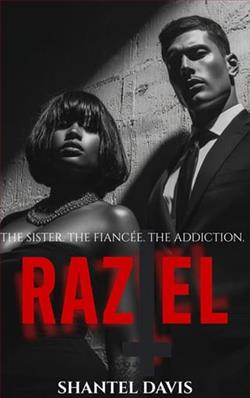Page 46 of The Lovers
By the time Elise returned to the house, she felt marginally better. They’d spent an hour in the garden, and despite her sour mood, the sight of colorful blooms and the heady fragrance of primroses lifted her spirits. Barbara drifted off to the parlor as soon as they came back in, intent on returning to her crewelwork, but Elise decided to stop by the kitchen for a cool drink. She was suddenly very thirsty. Elise walked along the passage, acutely aware of the silence enveloping the house. The only place bustling with activity was the kitchen, where Cook and several kitchen maids worked all day long to bake bread, roast meat, and prepare numerous side dishes that were hardly touched unless Edward came home. She supposed the servants ate well these days since all the leftovers went straight back to the kitchen for their own dinner.
Elise stopped just outside the kitchen when she heard Cook’s cry of dismay. She sounded unusually upset, her voice trembling with unchecked panic. She was normally a level-headed woman who ran her kitchen as a captain would his ship, so her distress was alarming.
“We must double our order of flour. Or even triple it. We don’t know ’ow long it’ll last this time,” Cook exclaimed. “And take stock of all our stores.”
“Come now, Bess, don’t ye despair. We’ve weathered it afore, and we will again,” a calm male voice said. It was the gardener, Cook’s husband, who’d come in for a cup of ale before returning to his work.
“Nay, John, I refuse to sit idly by,” Cook screeched. “We ought to prepare. There’ve already been several deaths in St. Giles,St. Clement Danes, and St. Andrew. A dwellin’ ’ad been sealed up in St. Giles, but a riot broke out and they freed the condemned, those soft-’earted fools. Don’t they know what will ’appen?” Cook wailed.
“Bess, this ’appens every year,” her husband tried to soothe her. “We are safe ’ere in ’is lordship’s ’ouse. ’Tis the poor that ’ave to worry, living in such close quarters as they do. We’re well removed from the city gates and slums.”
“Not far enough,” Cook retorted. “What’ya think, ye daft fool, that no people of quality die from the plague? Why, the king himself could be in danger. ’E’ll be off to the country, ye mark my words, leaving the common folk to die.”
Cook sounded quite hysterical, and Elise was suddenly no longer thirsty. She turned and fled, going back up to her bedroom. This was terrible news indeed. She’d been so wrapped up in her own feelings that she hadn’t paid much heed to what was happening outside. There were deaths from the plague every year, but having lived in Southwark, Elise and the rest of the family felt relatively safe. The first plague deaths each year were reported in areas close to the docks, having been brought to London aboard ships from Europe. Measures, in the form of a quarantine, had been instituted by the Privy Council. Ships from infected areas were required to dock at Hole Haven at Canvey Island for a period of forty days before entering the Thames Estuary. Only ships with a certificate of health were allowed to proceed upriver, and they had to pass another checkpoint at Tilbury or Gravesend.
Elise could understand Cook’s distress, but she thought the older woman was overreacting. Most deaths occurred in poor, overcrowded areas where people lived in squalor and filth. Those areas were found closest to the city gates and beyond city limits, in the Liberties. They were quite safe here; there was no need for panic. Besides, Edward was always at Whitehall Palace. He wasprivy to the latest news and would look after them should the need arise.
Elise kicked off her shoes and crawled into bed. Sunlight flooded the room, but she didn’t bother to draw the bed hangings. She was suddenly very tired and was asleep within minutes.
THIRTY-TWO
NOVEMBER 2013
London, England
Quinn got off the tube at Charing Cross Station and walked briskly toward St. Martin-in-the-Fields, where Rhys was due to meet her at ten. She’d considered if it was worth visiting a few other churches in the area just to give Rhys the impression that she was searching for a needle in a haystack, but she dismissed the idea. If Elise lived at Asher Hall, as all evidence suggested, then it stood to reason that she would have attended St. Martin-in-the-Fields, as it was the only church in the area at the time. Several other parishes were created later on in the seventeenth century to relieve the overcrowding, but that would have happened after Elise’s death. St. Martin’s had been enlarged and beautified during the reign of James I, and it would have been the church Elise was married in and attended until her untimely death.
The grandiose building that towered over Trafalgar Square was not the original church of St. Martin. There had been a church on the site as far back as medieval times, but the neoclassical building that graced the square now had been built in the eighteenth century. The church Elise attended would have been the one built during the reign of Henry VIII with the intention of diverting plague victims away from Whitehall Palace. The Tudor building was constructed of brick and decorated with stone facings. It boasted a tall tower with buttresses that could be seen for miles. At the time of construction, the area was quite literally a field between the cities of London and Westminster, hence the name St. Martin-in-the-Fields.
Quinn ascended the steps and smiled at Rhys, who was leaning against a column, hands in his pockets as he watched her approach. He had a knack for looking casual and elegant at the same time, a trick that few men mastered. Gabe always looked a bit disreputable, no matter how much effort he put in. He joked that it was the dark stubble that shadowed his jaw by midmorning and made him look slightly piratical, a genetic “gift” from the Norman ancestors whose portraits graced the gallery of his family home.
“I’d nearly given up on you,” Rhys said as she gave him a peck on the cheek.
“I’m only ten minutes late,” Quinn protested, glancing at her watch.
“I know. Just teasing. Shall we go in?”
They walked into the building and instantly lowered their voices so as not to disturb the solemn hush of the church. There was no service in progress, but at least two dozen tourists milled about, taking pictures and craning their necks to admire the soaring ceiling illuminated by chandeliers suspended by cables at equal intervals. Unlike most churches, this building was filled with space and light, and it could have just as easily been used as a palace instead of a place of worship.
“So, you think this would have been the church Lord Asher attended?” Rhys asked as his eyes scanned the stunning interior.
“It would have to be, although, of course, it wouldn’t have been this modern incarnation of the building. Everyone in his household would have attended it as well, unless they were Catholic, but given the jewelry we found and quality of the gown, the servants are of no interest to us. What we are looking for is anyone from the Asher family. The woman might have been his wife, or his daughter,” Quinn added.
“How do you know he had a daughter?” Rhys asked, intrigued.
“I don’t. I’m only suggesting that it’s possible,” Quinn improvised. She’d have to be more careful. She knew much about the Asher household from her visions, but ninety percent of what she had gleaned wasn’t supported by any historical data. She’d done extensive research on Lord Asher but found only a few mentions of his name in relation to the Privy Council. What she needed was personal information, but Edward Asher had been a courtier—a man largely forgotten by history.
“I think this is a long shot, actually,” Quinn said as they proceeded down the nave. “The records from the seventeenth century are likely no longer kept here, but I thought we’d ask.”
Rhys stopped to admire the ceiling while Quinn approached a woman in her thirties wearing a clerical collar.
“Hello, I’m Dr. Allenby, and that’s my colleague, Rhys Morgan. I was wondering if we might have a look at the archives. We are researching an individual who might have attended this parish in the mid-seventeenth century.”
The woman smiled pleasantly. “We do keep some records here, but they date from the twentieth century until the present. All the parish records from the seventeenth century have been moved to the City of Westminster Archive at 10 St. Anne Street,” the vicar replied. “We have so many people stopping by who are in search of their family history. I do wish we could be of more help.”
“You have been. Thank you very much.”
“Phew, I’m done in,” Quinn said as she closed a dusty parish register several hours later. “But I’m glad we got something.” She slammed her notebook shut with finality, stowed it in her bag and rose to her feet, easing her back.















